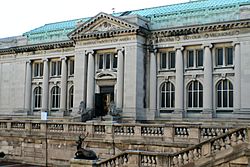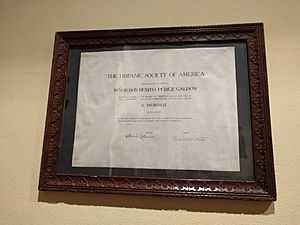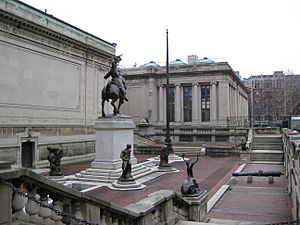Hispanic Society of America facts for kids
 |
|

Hispanic Society museum building on Audubon Terrace
|
|
| Lua error in Module:Location_map at line 420: attempt to index field 'wikibase' (a nil value). | |
| Established | May 18, 1904 |
|---|---|
| Location | New York City |
| Type | Art museum Research library |
| Collection size | 6,800 paintings 1,000 sculptures 175,000 photographs 250,000 books |
| Visitors | 20,000 |
| Public transit access | Subway: Bus: Bx6, Bx6 SBS, M4, M5, M100 |

The Hispanic Society of America is a special place in New York City. It has a museum and a huge library. It helps people learn about the art and cultures of Spain, Portugal, and their past colonies in places like Latin America. Even though it's called a 'society,' it's more like a museum and research center.
A kind person named Archer M. Huntington started it in 1904. It's still in its original building, which is a beautiful old style called Beaux Arts. This building is on Audubon Terrace in the Washington Heights area of Manhattan. A second building was added in 1930. The whole area became a National Historic Landmark in 2012. In 2021, the museum grew even bigger, taking over a nearby building.
Contents
Amazing Collections
The museum has over 18,000 artworks. These pieces come from ancient times all the way up to the 1900s. You can see important paintings by famous artists like Diego Velázquez, Francisco de Goya, El Greco, and Joaquín Sorolla. The collection also includes sculptures, furniture, metalwork, pottery, and textiles.
The Sorolla Room
One special part of the museum is the Sorolla Room. It was updated in 2010. Here, you can see Vision of Spain. These are 14 huge paintings that Archer Huntington asked Sorolla to create in 1911. Sorolla worked on them from 1913 to 1919. These paintings are very long, stretching over 200 feet! They wrap around the large room and show scenes from different parts of Spain.
The Library's Treasures
The library at the Hispanic Society is enormous. It holds more than 250,000 books, 200,000 documents, 175,000 photos, and 15,000 prints. The rare books section has 15,000 books printed before the year 1700! This includes a very first edition of the famous book Don Quijote. You can also find a rare Black Book of Hours from around 1458. Another amazing item is the huge Map of the World from 1526 by Juan Vespucio.
Why the Museum Was Created
In the late 1800s, people in America didn't always have good feelings about Spain. This was because Spain had tried to control much of North and South America centuries before. But by the early 1900s, people started to see how important Spanish culture was to American history.
Archer Huntington understood this. He wanted to show that Hispanic art was worth studying. So, he started the museum in 1904. He worked hard to collect a huge amount of Hispanic art. He also gathered historical items, literature, and thousands of books. This created a massive library for scholars to study Hispanic history, literature, art, and culture. Huntington wanted the institution to be a place for deep research, not just a display of art.
Designing the Building
Huntington was very involved in designing the museum building. The main building was based on ideas from his cousin, Charles P. Huntington. Archer Huntington dreamed of Audubon Terrace becoming a group of cultural buildings. The chosen design, called neoclassical, helped the Hispanic Society of America become the respected institution it is today.
Art Projects and Events
From 2007 to 2011, the Dia Art Foundation brought several art projects to the Hispanic Society. Artists like Francis Alÿs, Dominique Gonzalez-Foerster, and Koo Jeong A created special works there. There was also a weekly event called "Tuesdays on the Terrace." It offered public outdoor programs with dance, music, and poetry.
Museum Updates and Travel=
In 2015, the society announced big plans to make the museum much larger. They wanted to renovate a vacant building next door. This building used to be the home of the Museum of the American Indian.
Starting in 2017, the museum closed for major renovations. The project cost $15 million and included replacing the roof and lighting. The new East Building Gallery opened in 2021 for special art shows. The main museum fully reopened in June 2023.
While the museum was closed, many of its artworks traveled to other places. About 200 important pieces were shown at the Museo del Prado in Madrid in 2017. The exhibit then went to Mexico City, Albuquerque, Cincinnati, and Houston.
Admission to the museum has always been free. This was part of Archer Huntington's original plan. Even with the new galleries, admission remains free for everyone. In 2020, Guillaume Kientz became the museum's new director. He used to be a curator at the famous Louvre museum.
Notable People Connected to the Society
Many important scholars and curators have worked at the Hispanic Society. They helped build and care for its amazing collections.
- Georgiana Goddard King (1871–1939), an expert on Spain and medieval times.
- Mildred Stapley Byne (1875–1941), an early curator of architecture and applied arts.
- Clara Louisa Penney (1888–1970), an early curator of rare books and manuscripts.
- Florence Lewis May (1899–1988), an early curator of textiles.
- Elizabeth du Gué Trapier (1893–1974), an early curator of paintings and drawings.
- Alice Wilson Frothingham (1902–1976), an early curator of ceramics.
- Beatrice Gilman Proske (1899–2002), an early curator of sculpture.
- Eleanor Sherman Font (1896–1982), an early curator of prints.
- Ruth Matilda Anderson (1893–1983), an early curator of photographs and costumes.
See also
 In Spanish: Sociedad Hispánica de América para niños
In Spanish: Sociedad Hispánica de América para niños
- Hispanism
- Hispanist
- List of National Historic Landmarks in New York City
- National Register of Historic Places listings in Manhattan above 110th Street
- Beatrice Gilman Proske
 | William M. Jackson |
 | Juan E. Gilbert |
 | Neil deGrasse Tyson |


